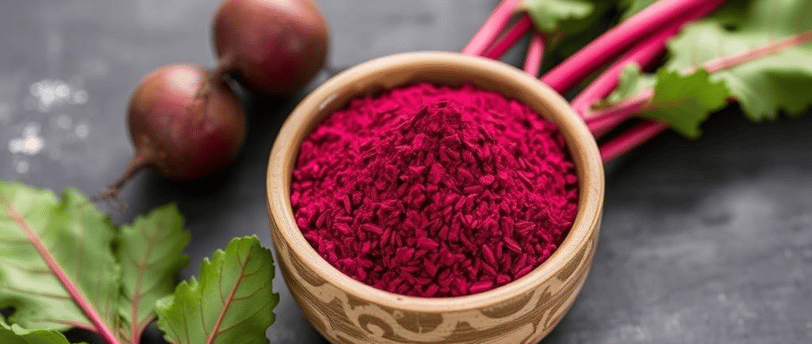Beet Root for Fitness: Boost Endurance and Performance Naturally
FITNESS, MUSCLE RECOVERY & PERFORMANCE


In the pursuit of optimal fitness and athletic performance, many individuals are constantly searching for natural and effective ways to enhance their training. Enter the vibrant and versatile beetroot – a root vegetable packed with nutrients and boasting a growing body of scientific evidence supporting its potential benefits for endurance and performance. This article delves into the power of beetroot, exploring its forms, benefits, potential side effects, and how to incorporate it into your fitness regimen.
The Power of Beetroot: What Makes it a Fitness Booster?
The key to beetroot's performance-enhancing abilities lies in its high concentration of nitrates. When consumed, these nitrates are converted into nitric oxide (NO) in the body. Nitric oxide plays a crucial role in:
Vasodilation: Relaxing and widening blood vessels, improving blood flow and oxygen delivery to muscles.
Mitochondrial Efficiency: Enhancing the efficiency of mitochondria, the powerhouses of cells, allowing them to produce more energy with less oxygen.
Muscle Contraction: Possibly improving muscle contraction efficiency, leading to better force production.
These effects translate to improved endurance, reduced fatigue, and enhanced overall athletic performance.
Forms Available:
Beetroot is readily available in various forms, making it easy to incorporate into your diet:
Fresh Beets: The most natural form, offering the full spectrum of nutrients. Can be roasted, boiled, juiced, or grated.
Beetroot Juice: Concentrated source of nitrates, providing a convenient way to consume a significant dose.
Beetroot Powder: Dehydrated and ground beetroot, easily added to smoothies, shakes, and pre-workout mixes.
Beetroot Capsules/Supplements: Convenient for precise dosing, especially for those who dislike the taste of beetroot.
Scientific Evidences :
Numerous studies have investigated the effects of beetroot supplementation on athletic performance. A meta-analysis published in the Journal of the Academy of Nutrition and Dietetics concluded that acute beetroot juice supplementation can improve endurance exercise performance. [Reference 1] Another study in the Journal of Applied Physiology found that beetroot juice supplementation reduced oxygen cost during cycling, suggesting improved efficiency. [Reference 2] Research continues to explore the optimal dosage, timing, and specific benefits for various sports and activities.
Common Symptoms and Benefits:
Consuming beetroot regularly can lead to several potential benefits, including:
Improved Endurance: Reduced fatigue and increased time to exhaustion during prolonged exercise.
Enhanced Power Output: Increased muscle strength and power, beneficial for activities like weightlifting and sprinting.
Faster Recovery: Reduced muscle soreness and inflammation after intense exercise.
Lower Blood Pressure: Nitric oxide's vasodilatory effects can contribute to lower blood pressure levels.
Improved Cognitive Function: Enhanced blood flow to the brain may improve cognitive function and focus.
Dosage:
The optimal dosage of beetroot for performance enhancement varies depending on individual factors, activity level, and the form of beetroot consumed. However, general recommendations include:
Beetroot Juice: 300-500 ml, consumed 2-3 hours before exercise.
Beetroot Powder: 6-8 grams, mixed with water or a smoothie, consumed 2-3 hours before exercise.
It's best to start with a lower dose and gradually increase it to assess tolerance. Consistent consumption over several days may be necessary to experience the full benefits.
Recipes:
Here are a few simple recipes to incorporate beetroot into your diet:
Beetroot Juice: Blend fresh beetroot, apple, ginger, and lemon for a refreshing and energizing drink.
Roasted Beetroot Salad: Toss roasted beetroot with mixed greens, goat cheese, walnuts, and a balsamic vinaigrette.
Beetroot Smoothie: Blend beetroot powder, banana, spinach, almond milk, and protein powder for a post-workout recovery smoothie.
Causes:
Beetroot's ergogenic effects are primarily attributed to the nitrates it contains, which the body converts to nitric oxide. Other contributing factors include the presence of betalains, powerful antioxidants with anti-inflammatory properties. These compounds work synergistically to improve blood flow, oxygen delivery, and cellular efficiency.
Side Effect and Precaution:
While beetroot is generally safe for consumption, some individuals may experience side effects:
Beeturia: Red or pink urine, a harmless but noticeable symptom caused by betalain pigments.
Gastrointestinal Distress: Some individuals may experience bloating, gas, or diarrhea, especially with high doses.
Kidney Stones: Beetroot contains oxalates, which can contribute to kidney stone formation in susceptible individuals. Consume in moderation if you have a history of kidney stones.
Medication Interactions: Beetroot may interact with certain medications, such as blood thinners and erectile dysfunction drugs. Consult with your doctor before incorporating beetroot into your diet if you take any medications.
Conclusion:
Beetroot offers a natural and promising approach to enhance fitness and athletic performance. Its nitrates, converted to nitric oxide, improve blood flow, mitochondrial efficiency, and muscle function. While individual responses may vary, research supports the potential benefits of beetroot supplementation for endurance, power, and recovery. By incorporating beetroot into your diet through juice, powder, or whole beets, you can potentially unlock a new level of performance and achieve your fitness goals. Remember to start with a low dose, monitor your body's response, and consult with a healthcare professional if you have any concerns or pre-existing medical conditions.
References and Links:
[Reference 1]: Journal of the Academy of Nutrition and Dietetics (Search for meta-analysis on beetroot juice and exercise) [Reference 2]: Journal of Applied Physiology (Search for beetroot juice and oxygen cost of exercise)
(Note: Please replace the placeholder references with actual links to relevant research articles and citations.)
